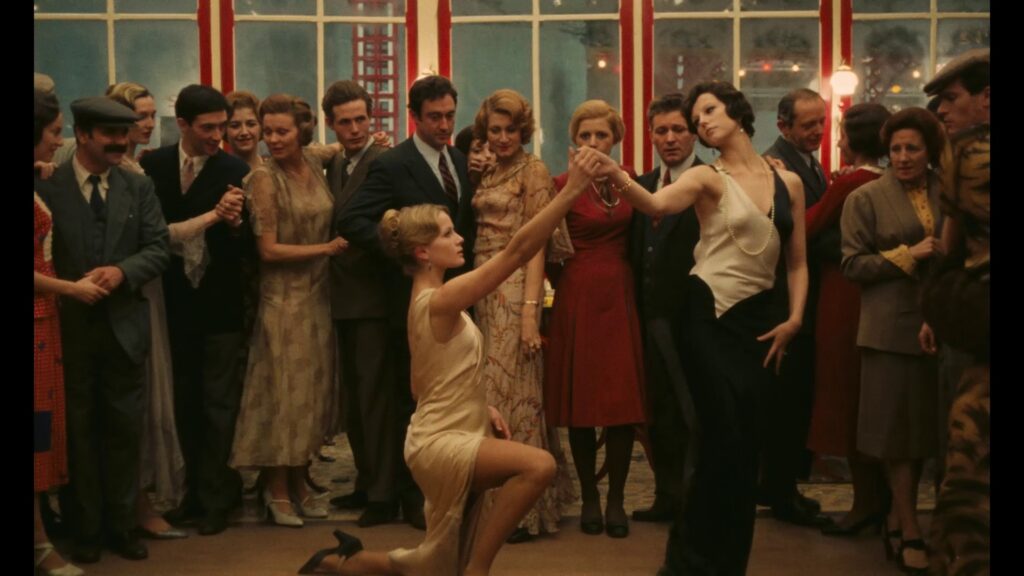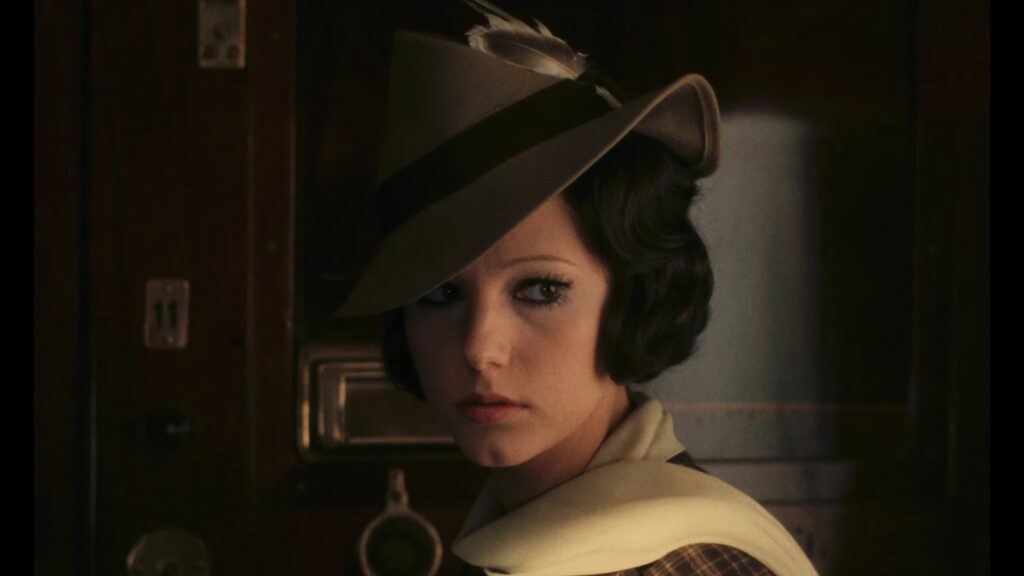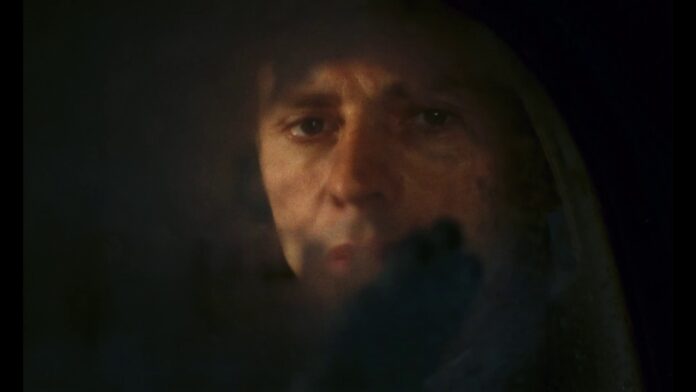At 30 in 1970, Bernardo Bertolucci had already made three narrative features (plus an anthology segment, a long TV documentary, and several shorts), all of them attracting some attention on the festival circuit. Still, he was hardly considered a major figure, so the reaction stirred by his fourth at its Berlin Fest debut came as a surprise—even if the whole event wound up being overshadowed by political controversy. (West German Michael Verhoeven’s incendiary anti-Vietnam War drama OK was removed from competition over jury chief George Stevens’ protest that it was “anti-American,” a move that itself incited such angry backlash, no awards were given at all and the festival’s very future briefly seemed in doubt.)
Amid movies by Satyajit Ray, Roy Andersson, Alain Robbe-Grillet, Fassbinder, De Palma, and others, The Conformist had been an unanticipated standout, dazzling in the perfection of its hermetically-sealed high style. Released in the US the next year, it was the director’s first commercial, international, and widespread critical success.
Over half a century later, it still looks great—particularly in the new 4K restoration opening Fri/21 at the Roxie—and a case can be made that it remains Bertolucci’s most seamlessly realized work. Not his best, necessarily, let alone most provocative, emotive, or memorable. But even if some later films left an even greater impression in their messier excesses, The Conformist was the one where everything worked, breathtakingly decadent aesthetic meshing with thorny political and psychological content. Even if some argued that the overwhelming surface style was at odds with Alberto Moravia’s adapted 1947 novel.
Marcello Clerici (Jean-Louis Trintingant, giving one of his best performances) is a bureaucrat in 1938 Rome under Mussolini’s fascist regime, one willingly recruited to the secret police. Yet his minders are somewhat puzzled by his motivations, which seem unrelated to actual political fervor, violent impulses, or desire for power. He can’t explain to them what he barely understands himself: His alliance with this reactionary state is itself a reaction against the chaos of his past, as we realize upon meeting his drug-addicted harridan of an aristocrat mother (Yvonne Sanson), with whom he visits his mad, babbling father (Giuseppe Addobbati) at an asylum. There was also a scarring childhood incident in which young Marcello shot a chauffeur (Pierre Clementi) who meant to “interfere” with him—as, in the novel, it is suggested his father used to.
Ergo our slightly sociopathic protagonist has a mission, to “construct my normality” like a mask no one will be able to see past. To that end, he courts and marries the most adoring, unsuspecting bourgeoise airhead he can find (Stefania Sandrelli as Giulia), among other accoutrements of success. He also seeks to destroy or erase any evidence of self-doubt, no matter how it continues to plague him.
Thus he accepts an assignment to locate and assassinate onetime mentor Professor Quadri (Enzo Tarascio), who’s fled the country but continues to write influential screeds against fascism. Under the pretense of a Paris honeymoon with Giulia, he reunites with that academic, which also brings the couple in contact with the man’s much younger wife Anna (Dominique Sanda)—a figure of intense sexual magnetism to both the newlyweds. Guilelessly taken in by Quadri, if viewed by more suspicion by Anna, Marcello feels stirrings of conscience… or something. But he’s shadowed by the thuggish Manganiello (Gastone Moschin), an unapologetic blackshirt who’ll ensure he gets the dirty job done.

The Conformist was Bertolucci’s first collaboration with the cinematographer Vittorio Storaro, who would also do fine work for Coppola, Carlos Saura, Warren Beatty, Woody Allen, Elaine May, Dario Argento, and others. But their collaboration was in a class by itself—neither was ever quite so inspired without the other, form determining function and (arguably to a lesser extent) vice versa. Here, everything about the visual presentation is enveloping, at once seductive and alienating: The period-perfect Art Deco decor and costumes, Storaro’s inimitable saturated-color lighting and choreographic tracking shots, the era’s monumentalist architectural locations, the placement of surreal jokes or disruptors within striking compositions.
All this adds up to something more than mere style, or mannerism—even if it was not a very precise match to Moravia’s coolly detached prose, which perhaps more exactly portrayed Marcello’s amoral soullessess. But it would hardly be the first, or last, time that a great film was something of a betrayal of its literary source. (Paul Bowles wasn’t especially happy 20 years later with Bertolucci’s less-nihilistic take on The Sheltering Sky, but nonetheless it was the director’s last masterpiece.) This Conformist immediately announces itself as a rarefied objet d’art, its exquisitely crafted parts so smoothly interlocking it’s like a beautiful, inexplicable machine.
The horrific consequences of our anti-hero’s actions—and inactions—are so startling that i’d forgotten the movie goes on for almost another 20 minutes after reaching its famous violent crescendo on an isolated mountain road. There are other classic setpieces, including the female leads’ notorious tango (shorter than remembered), and a memorable sequence at a party for an organization of the blind that was long edited out of most prints, for no obvious reason. Now as then, the film’s singularity occupies no particular era, abstracting the 1930s while standing apart from the early 70s; it remains strange, sardonic, potent, and unforgettable.

Bertolucci and Storaro would temporarily obscure even this triumph with the international clamor over Last Tango in Paris, which had originally been intended for Trintignant and Sanda (who was never so alive onscreen for any other director). Instead, Brando’s baggage and Maria Schneider’s body made it a shocking smash that arrived at the same moment as “porno chic.” Its reputation has been complicated ever since by not only its own mixed messages, but confusion over the actress’ later comments about it. Both she and Brando felt psychologically manipulated by the director, then blindsided by the film’s notoriety. Schneider in particular was not, at age 20, prepared for fame—let alone a kind that made her a sort of emblem for sexual “freedom.”
Speaking eventually of the infamous simulated-penetration “butter” scene, which was not in the script, she said “I felt a little raped,” a statement later clarified. But there are still people who assumed as a result that she was actually physically assaulted, so when Bertolucci died in 2018 the posthumous appreciations were muffled by fears that they’d be accused of celebrating a predatory monster. (For what it’s worth, several later actresses including Debra Winger and Jill Clayburgh considered working with him to be among their happiest career experiences.)
By then he’d been largely forgotten, anyway, because the subsequent multiple Oscar winner for 1987’s epic The Last Emperor—by far his most popular feature—spent 15 final years mostly incapacitated by a back condition. Even before then, his films had been wildly variable for some time, though a final small feature he managed to make (without Storaro) in 2012, Me and You, recaptured some of the old fire.
His was a sadly muted farewell for a man whose artistic stature had always been hotly debated, but who was a leading figure during a great cinematic decade, the Seventies. His work remains idiosyncratically distinctive even at its least, the best of it pretty sublime. It’s still a revelation to see The Conformist for the first time, and the many tricks up its sleeve may yet surprise those who saw it plenty in the days when it was a revival-house staple.







